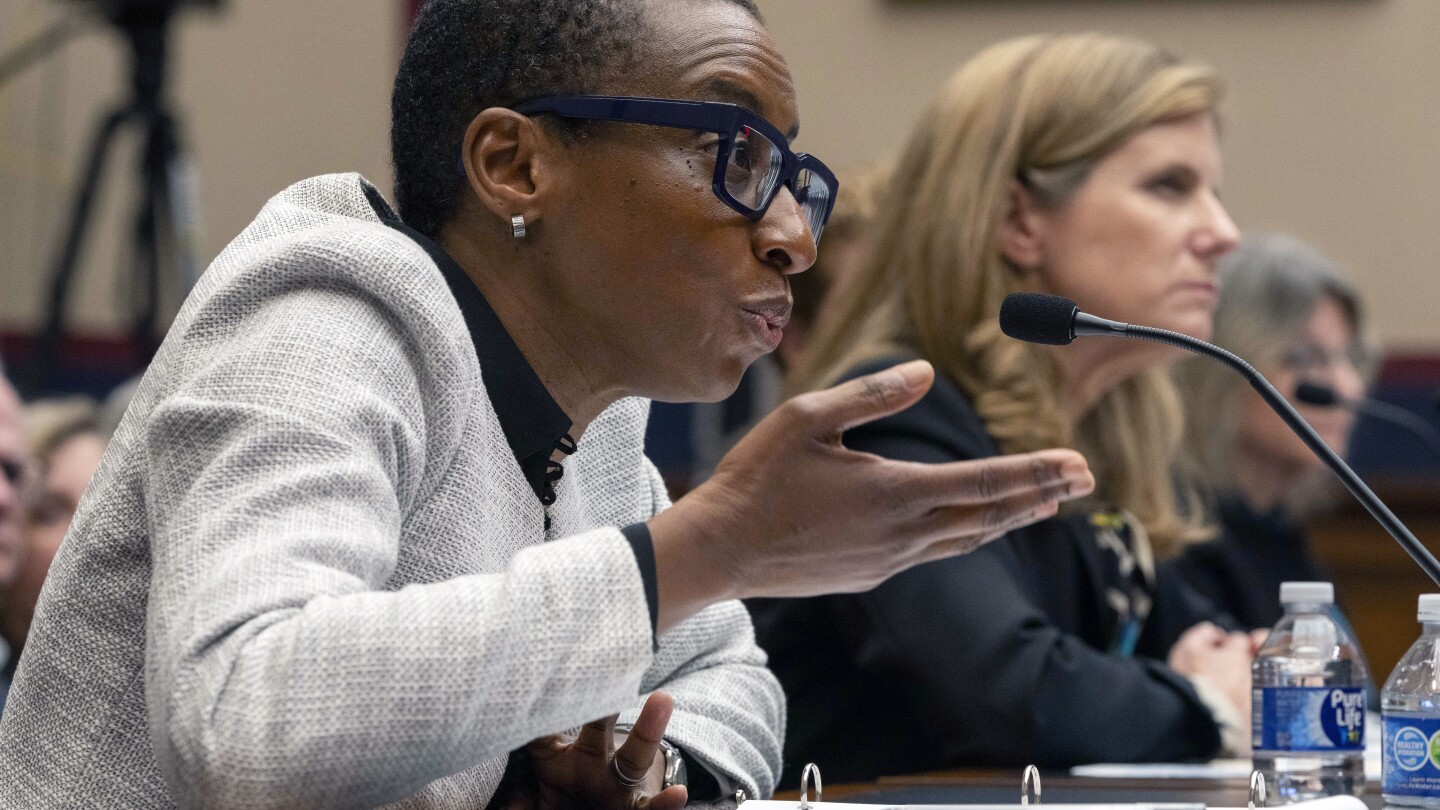WASHINGTON (AP) — Hundreds of Harvard faculty members are urging the Ivy League university to keep its president, Claudine Gay, in command as she faces calls from some lawmakers and donors to step down over comments at a congressional hearing on antisemitism.
A petition signed by more than 600 faculty members asks the school’s governing body to resist political pressures “that are at odds with Harvard’s commitment to academic freedom.”
Only months into her leadership, Gay came under intense scrutiny following the hearing in which she and two of her peers struggled to answer questions about campus antisemitism. Their academic responses provoked a backlash from Republican opponents, along with alumni and donors who say the university leaders are failing to stand up for Jewish students on their campuses.
Liz Magill resigned as president of the University of Pennsylvania on Saturday amid criticism of her handling of the hearing. Rep. Elise Stefanik, a New York Republican whose questions sparked the episode, saw it as the first domino: “One down. Two to go,” she said on X, formerly Twitter.
The spotlight has turned to Gay, a scholar of politics and African American studies who became Harvard’s first Black president in July. In a letter to Harvard’s governing body, more than 70 mostly Republican members of Congress called for her resignation. Billionaire alumnus Bill Ackman also called for her ouster, saying Gay has done more damage to Harvard’s reputation than anyone in its history.
Harvard’s highest governing body was scheduled to meet Monday and has not issued a public statement since the hearing. On Thursday, MIT’s governing body issued a statement declaring “full and unreserved support” for President Sally Kornbluth, whose testimony also drew scathing criticism.
The faculty petition aims to parry what many of its signers see as a Republican attempt to wield influence over the elite institution. Harvard and the Ivy League have long been a favorite target of GOP lawmakers who see top universities as hubs of liberalism. The petition is seen not necessarily as a defense of Gay but an attempt to insulate the school from the intrusion of political pressure.
“We have lawmakers getting intimately involved in trying to dictate governance on campus, and this seems unacceptable,” said Melani Cammett, a professor of international affairs who helped organize the petition. Harvard needs to reckon with campus polarization, she added, but “that’s not something that should be controlled by external actors.”
Those backing the petition include some professors who have been critical of Gay. Among them is Laurence Tribe, a legal scholar who described Gay’s testimony as “hesitant, formulaic, and bizarrely evasive.” He endorsed the petition because “it’s dangerous for universities to be readily bullied into micromanaging their policies,” he said in an interview. But his view on Gay hasn’t changed.
“I think she now has a great deal to prove, and I’m not at all sure that she will be able to prove it,” he said. “I don’t think she is out of the woods by any means.”
Universities across the U.S. have been accused of failing to protect Jewish students amid rising fears of antisemitism worldwide and fallout from Israel’s intensifying war in Gaza, which faces heightened criticism for the mounting Palestinian death toll.
The three presidents were called before the committee to answer those accusations. But their lawyerly answers drew renewed blowback from opponents, focused particularly on a line of questioning from Stefanik, who repeatedly asked whether “calling for the genocide of Jews” would violate the schools’ rules.
“If the speech turns into conduct it can be harassment, yes,” Magill said. Pressed further, Magill told Stefanik, “It is a context-dependent decision, congresswoman.”
Gay gave a similar response, saying that when “speech crosses into conduct, that violates our policies.”
Gay later apologized in an interview with The Crimson student newspaper, saying she “got caught up in what had become at that point, an extended, combative exchange about policies and procedures.”
“What I should have had the presence of mind to do in that moment was return to my guiding truth, which is that calls for violence against our Jewish community — threats to our Jewish students — have no place at Harvard, and will never go unchallenged,” Gay said.
___
The Associated Press education team receives support from the Carnegie Corporation of New York. The AP is solely responsible for all content.

